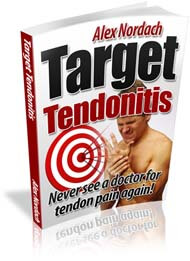“I wrote a short article on glucosamine and tendon pain a little while back, but I’ll just post quickly about the subject here again, because I keep seeing this stuff advertised. Basically, there are websites out there that try to sell you glucosamine for tendonitis. It’s supposed to work well for joints, so I guess that they figure it will work for tendons, too.
The problem is, tendons aren’t joints. Joints are made up of cartilage, which glucosamine helps the body to form, but tendons are made up of collagen. Tendons have blood vessels in them, joints don’t. Joints connect bones to other bones; tendons connect bones to muscles. And so on. Physiologically and mechanically, they’re completely different tissues.
But people get collagen and cartilage confused, because they sound sort of the same. They both have three syllables. They both start with a C and have an L or two in the middle, and a G towards the end there. And unscrupulous marketers take advantage of this unconscious confusion to try to sell you one when it has nothing to do with the other. Most often the stuff they’re trying to sell you is in the form of pills, but sometimes it’ll be a spray or ointment that you’re supposed to apply directly to the skin, or occasionally a powder that you mix into liquid. But it doesn’t matter what the delivery method is, these products won’t do the job.
If you have joint pain, then by all means try glucosamine. There is at least some evidence that it may help, and it certainly won’t hurt you. Furthermore, it’s widely available and pretty cheap. But selling the stuff for tendon pain is nothing more than preying on the gullibility and medical ignorance of the general populace. It’s a rip-off, and any website that lists it for tendonitis, tendonosis or any other form of tendonopathy should be avoided.


